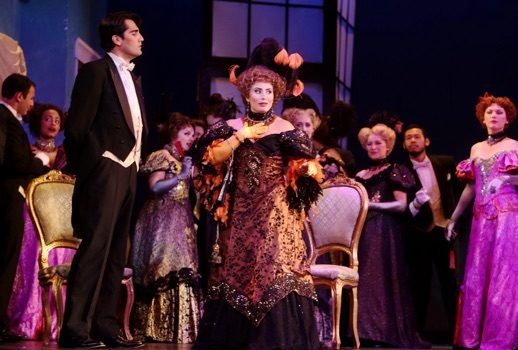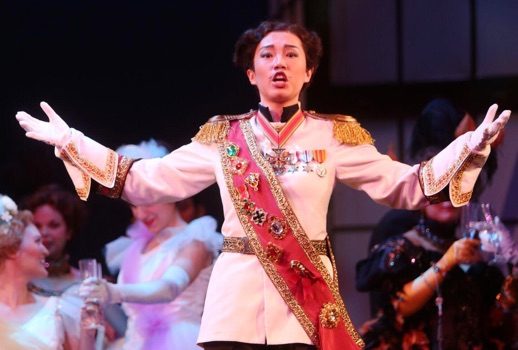
The intoxicating effect of wine is an appropriate metaphor for an opera so preoccupied with drinking and drunkenness. Indeed, many of the characters within the narrative enthusiastically choose to imbibe alcohol, from the revelers at Orlofsky’s party to the comedic Frosch at the prison, figures throughout the plot stumble across the stage, seeing double.
Just as Alfred implores Rosalinde, “Trink mit mir, sing mit mir,” the opera encourages us to join in the celebration. There’s even an ode to Champagne, the king of wines, concluding the opera—“die majestät wird anerkannt…” yes, indeed.
And I think it could be argued that the function of wine within the opera’s plot is a key symptom of a desire plaguing many of Die Fledermaus’ characters. It is a longing for transformation that Rosalinde, Eisenstein, and Adele court—a desire to push against the strict boundaries imposed by their sexual, social, and economic positions. The connection between this desire and the mechanism of alcohol can be made explicit. In The Birth of Tragedy, Nietzsche has this to say about alcohol and identity:
…through the influence of the narcotic drink…Dionysian impulses find their source, and as they grow in intensity everything subjective vanishes into complete loss of self-recognition.
Indeed, to drink is to forget the nature of the self, and consequently to allow the self to transform. And in Die Fledermaus, Bacchus reigns supreme, constructing an inebriated screen through which certain characters learn to re-see themselves.
As a matter of course, the opera’s central tableau is a bacchanal—a masquerade, champagne-soaked, flush with sweet slippages of identity, and the modicum of freedom this entails. In the shadowy, upside-down sphere of revelry, Eisenstein, Rosalinde, and Adele find within the crepuscular hours of evening what they cannot quite pursue in the light: ways to push back against the boundaries imposed by their identities, to pursue their own Dionysian impulses with freedom.
As Adele asks ruefully in the opera’s first act: “Ach, warum schufst du, Natur/ Mich zur Kammerjungfer nur?” In the glittering candlelight of evening, she discovers how to subvert her nature, how to respond to this question with her own á rebours transformation.

Singing actors rove across the stage, whipping up a frothy frenzy of delightful confusion, hitting their marks with dexterous speed, all the while singing evenly and in tune. In fact, while on the surface Die Fledermaus may seem like a trifling confection, its success requires a great deal of skill and craft.
The singers in Prelude to Performance’s Die Fledermaus, presented under the auspices of the Martina Arroyo Foundation, managed to surmount these obstacles with a rare professional polish. Despite the youthful countenances of the singers on the stage, taken out of context, the evening might have easily been confused for a top-notch professional company. Consistent in its high quality, this Die Fledermaus intoxicated me. I was drunk in love.
To begin with, there was the singing. As Rosalinde, Haley Sicking is nothing short of a star: a tireless, secure soprano that managed to be both voluminous and flexible. And though Rosalinde can be a difficult character to pull together, Sicking’s blooming voice complimented her innate sense of comedic timing.
As her adversary and husband, Jonathan Tetelman sang a spontaneously genuine Eisenstein, possessing the charisma necessary to maintain one’s interest in the character, despite his dubious ethics. And as Adele, the chambermaid-turned-stage-actress, Shana Grossman’s gorgeously ductile voice complemented an utterly charming depiction, one that refused caricature in favor of an utterly genuine charm.
Other members of the ensemble proved equally commendable. As Prince Orlofsky, Hongni Wu managed the difficult stage presence demanded of the pants role, while simultaneously singing with a satisfying, cutting mezzo-soprano. And as Dr. Falke, Thaddaeus Bourne’s launch of the second act “Brüderlein und Schwesterlein” was lyrical and touching, where many performers might have veered too close to sentimentality.
Though the innate talents of these young performers were commendable in many ways, they were obviously supported by an extremely competent production team. Beyond the superb singing, the whip-smart direction of Gina Lipinski and the brisk, elegant conducting of Steven M. Crawford invigorated the proceedings exponentially. And the sparkling costumes, by Charles R. Caine, contributed significantly to the opera’s overall glamour.
Such wonderful ingredients led to an uncommon sensation of intoxication, a delightful feeing of transport rarely found outside of mind-altering substances. Like Adele, Eisenstein, and Rosalinde, the opera itself provides a similar escape to that of spirits—a way to forget the all-too-real limitations one is constantly at odds with, an opportunity to imagine an alternative to the hum drum of the quotidian, and a welcomed chance to immerse oneself in a world of shadows and light.
Photos: Jen Joyce Davis



